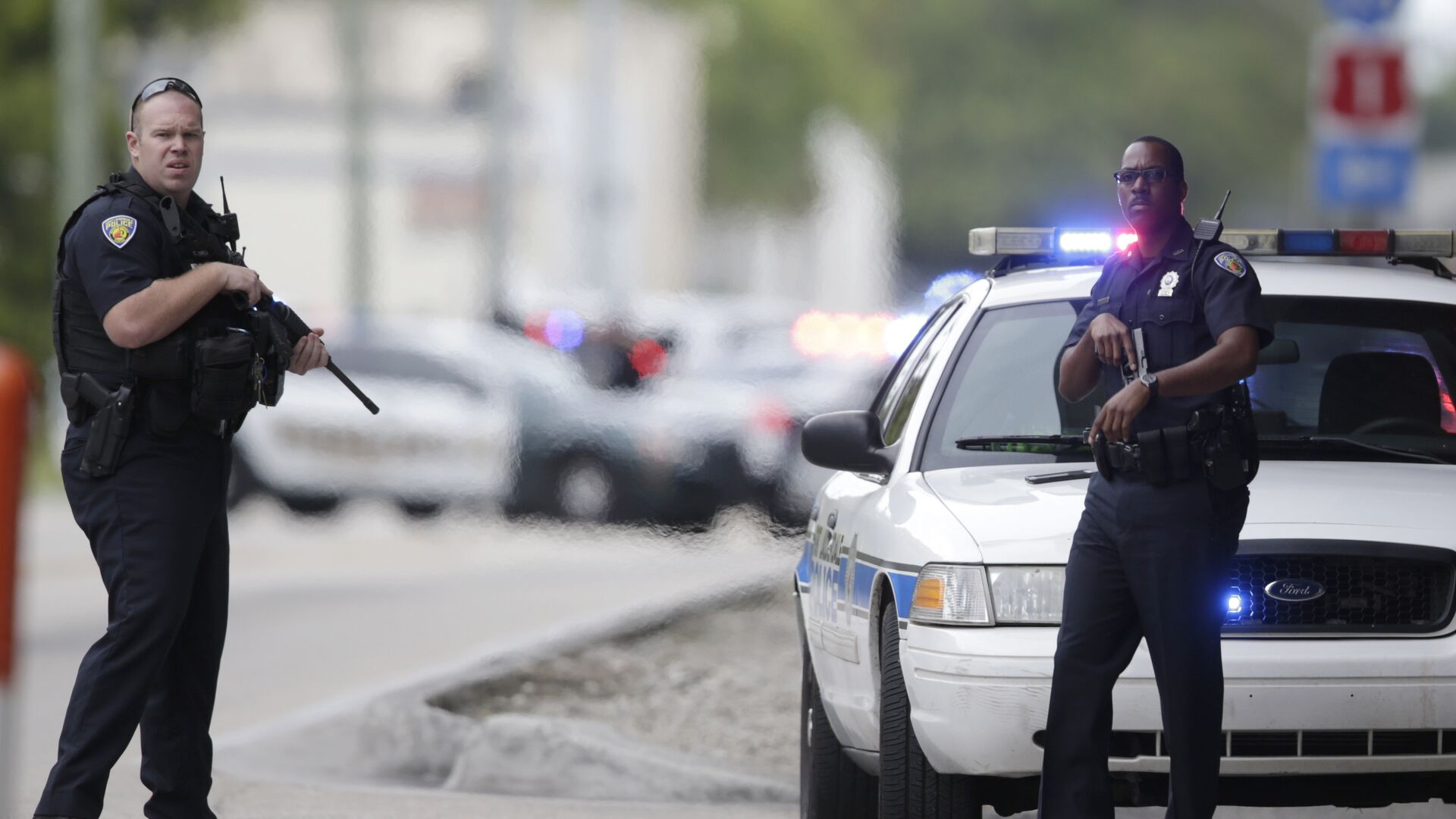https://sputnikglobe.com/20211103/why-minneapolis-residents-say-nay-to-disbanding-police--why-dems-should-worry-about-it-1090455443.html
Why Minneapolis Residents Say 'Nay' to Disbanding Police & Why Dems Should Worry About It
Why Minneapolis Residents Say 'Nay' to Disbanding Police & Why Dems Should Worry About It
Sputnik International
The majority of Minneapolis residents have not endorsed the idea of disbanding the city's police department nearly 18 months after George Floyd's death in... 03.11.2021, Sputnik International
2021-11-03T18:34+0000
2021-11-03T18:34+0000
2021-11-03T18:34+0000
joe biden
world
us
opinion
minneapolis
republican party
democratic party
black lives matter
police reform
racial justice
https://cdn1.img.sputnikglobe.com/img/104944/64/1049446459_0:281:3672:2347_1920x0_80_0_0_938b8bdfd7d0d68159f733d4665ac8d7.jpg
Over 56% of voters said "nay" to Question Two, which envisaged replacing the police department with a new agency called the Department of Public Safety. Proponents of the reform argued that it would stop police violence, while opponents insisted that the proposal had no concrete plan for how to move forward.Earlier this year, the annual Uniform Crime Report indicated a nearly 17% surge in violent crimes across Minnesota in 2020 in the wake of Black Lives Matter protests and the COVID-19 outbreak. In particular, the state recorded 185 murders last year, up 58% from 117 in 2019.Failure of Minneapolis Police ReformThe significant spike in murders in Minneapolis in the last year, disproportionately in African American neighbourhoods, obviously influenced the polls, according to August H. Nimtz, professor of political science and African American and African Studies at the University of Minnesota.The push for disbanding the police department has failed for several reasons, notes David Schultz, a political science professor at Hamline University in Minnesota. First, fears of personal safety amid the murder spike were powerful and people opted to have traditional policing to protect themselves; second, people of colour – the greatest victims of soaring crime rates – also opposed the reform measures. Third, it appears that moderate Democrats feared that if the proposal would have been adopted, the Republicans would use law and order as an issue against the party in the 2022 elections, according to the academic.The outcry for a police reform was largely triggered by the death of George Floyd in May 2020 with predominantly Democratic strongholds considering the idea of reducing police budgets or eliminating the agency altogether. However, if a police reform could not pass in Minneapolis, the city where George Floyd was murdered, then it probably cannot pass anywhere in the US, according to Nimtz."Minneapolis was the national centre for concerns about police reform and use of excessive force against people of colour", the professor says. "It is a city with enormous racial disparities. The momentum for reform was there and cities across the country were looking to what happened there as a signal".Dems Urgently Need New Viable StrategyHowever, there's more to the Minneapolis police reform defeat than meets the eye, according to the observers: it also serves as a warning to the Democrats, who have long spearheaded the police reform agenda.The Republicans are likely to continue to paint the Dems as "against police" in the 2022 midterm elections and the Democratic Party needs to come up with an alternative theme or message to counteract it, according to David Schultz.In addition to that, Joe Biden's plummeting approval rating and a series of blunders with regard to the US border crisis, economy, Afghanistan withdrawal, and handling of the COVID-19 pandemic are threatening to backfire on the Democratic Party's 2022 prospects.The nation is politically and racially divided and it does not look like it will heal for 2022 or 2024, the political scientist believes. "The internal problems of the US also cause international image problems for America as it tries to project a unified voice and face", he warns.Meanwhile, the latest mayoral race in New York City showed citizens flocking to a Democratic "law-and-order" candidate, former NYPD officer Eric Adams. In Virginia – where no Republican had won statewide office since 2009 – the latest gubernatorial contest saw the victory of a Republican candidate, Glenn Youngkin. At the same time, in New Jersey the race between Democratic Gov. Philip D. Murphy and Republican Jack Ciattarelli remains too close to call.
https://sputnikglobe.com/20211103/minneapolis-residents-vote-against-abolishing-police-department---preliminary-results-1090431132.html
minneapolis
Sputnik International
feedback@sputniknews.com
+74956456601
MIA „Rossiya Segodnya“
2021
News
en_EN
Sputnik International
feedback@sputniknews.com
+74956456601
MIA „Rossiya Segodnya“
Sputnik International
feedback@sputniknews.com
+74956456601
MIA „Rossiya Segodnya“
joe biden, us, opinion, minneapolis, republican party, democratic party, black lives matter, police reform, racial justice, us midterm elections, covid-19, george floyd
joe biden, us, opinion, minneapolis, republican party, democratic party, black lives matter, police reform, racial justice, us midterm elections, covid-19, george floyd
Why Minneapolis Residents Say 'Nay' to Disbanding Police & Why Dems Should Worry About It
The majority of Minneapolis residents have not endorsed the idea of disbanding the city's police department nearly 18 months after George Floyd's death in police custody, which prompted large-scale racial justice protests nationwide. Minnesota academics August H. Nimtz and David Schultz have explained what's behind the reform's failure.
Over 56% of voters said "nay" to Question Two, which envisaged replacing the police department with a new agency called the Department of Public Safety. Proponents of the reform argued that it would stop police violence, while opponents insisted that the proposal had no concrete plan for how to move forward.
Earlier this year, the annual Uniform Crime Report indicated a nearly 17% surge in violent crimes across Minnesota in 2020 in the wake of Black Lives Matter protests and the COVID-19 outbreak. In particular, the state recorded 185 murders last year, up 58% from 117 in 2019.
Failure of Minneapolis Police Reform
The significant spike in murders in Minneapolis in the last year, disproportionately in African American neighbourhoods, obviously influenced the polls, according to August H. Nimtz, professor of political science and African American and African Studies at the University of Minnesota.
"The proponents of the police reform proposal never ever addressed in any meaningful way the problem", argues Nimtz. "Nor were they able to convince voters that they would offer a more concrete alternative to business as usual. 'Trust us', they seemed to be saying. The vast majority of citizens know that there is a problem with the police. But what is the alternative?"
The push for disbanding the police department has failed for several reasons, notes David Schultz, a political science professor at Hamline University in Minnesota. First, fears of personal safety amid the murder spike were powerful and people opted to have traditional policing to protect themselves; second, people of colour – the greatest victims of soaring crime rates – also opposed the reform measures. Third, it appears that moderate Democrats feared that if the proposal would have been adopted, the Republicans would use law and order as an issue against the party in the 2022 elections, according to the academic.
The outcry for a police reform was largely triggered by the death of George Floyd in May 2020 with predominantly Democratic strongholds considering the idea of reducing police budgets or eliminating the agency altogether. However, if a police reform could not pass in Minneapolis, the city where George Floyd was murdered, then it probably cannot pass anywhere in the US, according to Nimtz.
"Minneapolis was the national centre for concerns about police reform and use of excessive force against people of colour", the professor says. "It is a city with enormous racial disparities. The momentum for reform was there and cities across the country were looking to what happened there as a signal".

3 November 2021, 02:15 GMT
Dems Urgently Need New Viable Strategy
However, there's more to the Minneapolis police reform defeat than meets the eye, according to the observers: it also serves as a warning to the Democrats, who have long spearheaded the police reform agenda.
The Republicans are likely to continue to paint the Dems as "against police" in the 2022 midterm elections and the Democratic Party needs to come up with an alternative theme or message to counteract it, according to David Schultz.
In addition to that, Joe Biden's plummeting approval rating and a series of blunders with regard to the US border crisis, economy, Afghanistan withdrawal, and handling of the COVID-19 pandemic are threatening to backfire on the Democratic Party's 2022 prospects.
"Democrats should worry", says David Schultz. "Historically the president’s party does badly in midterm elections and right now the results in 2021 do not suggest good news for Democrats holding Congress or doing well. The low approval ratings for the president, a divided party, a party unable to move the president’s agenda, all of this signals problems for Democrats. They need to change the messaging and right now they are not in control of their themes".
The nation is politically and racially divided and it does not look like it will heal for 2022 or 2024, the political scientist believes. "The internal problems of the US also cause international image problems for America as it tries to project a unified voice and face", he warns.
Meanwhile, the latest mayoral race in New York City showed citizens flocking to a Democratic "law-and-order" candidate,
former NYPD officer Eric Adams. In Virginia – where no Republican had won statewide office since 2009 – the latest gubernatorial contest saw the victory of
a Republican candidate, Glenn Youngkin. At the same time, in New Jersey the race between Democratic Gov. Philip D. Murphy and Republican Jack Ciattarelli remains too close to call.



